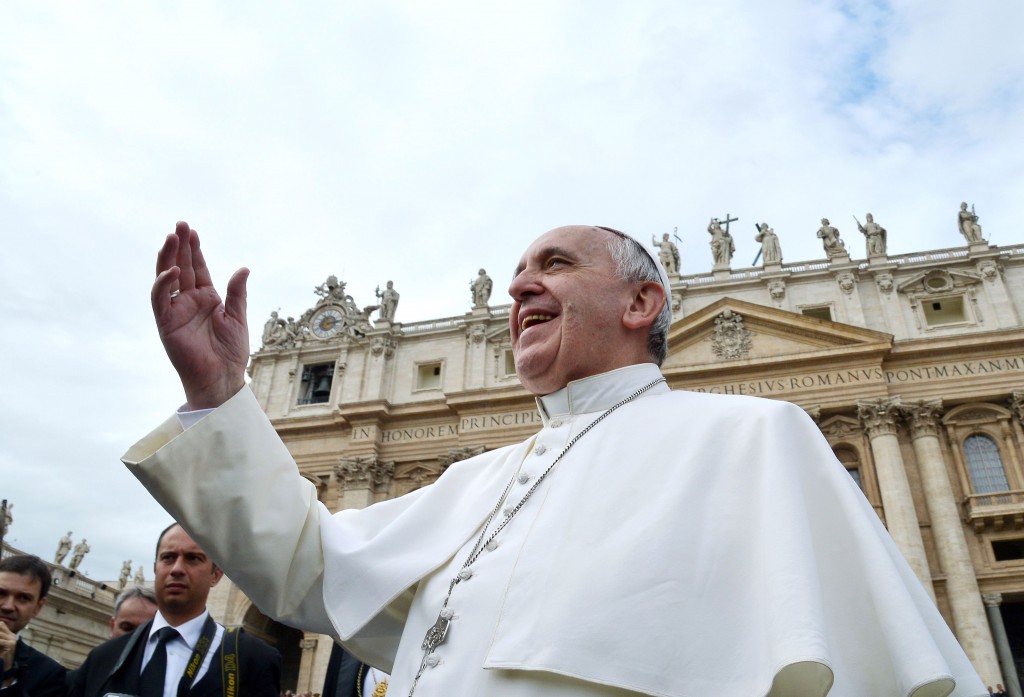Photography by Getty Images, courtesy NY Post
The Catholic Church has announced that His Holiness Pope Francis would be visiting Sri Lanka from January 13th to 15th, next year. Preceding the announcement, were visits to the Vatican by both the Sri Lankan Catholic hierarchy as well as senior government figures, both of whom extended the invitation for the Pope’s visit.
The incentive for the Sri Lankan Government to have a high level visitor is rather obvious, somewhat besieged as it is with a UNHRC probe on its human rights track record. For the Sri Lankan Catholic church, it is quite an achievement because the size of the Sri Lankan Catholic community relative to the global Catholic church would not normally merit Papal attention. The fact that the visit is occurring, demonstrates the influence that Cardinal Malcolm Ranjith wields in the dovecotes of power at the Vatican, dating back to his days in the Curia in Rome.
Meanwhile, Pope Francis since his elevation to the high office of Pontiff, the spiritual head of the global Catholic Church has moved swiftly to radically revamp the Papacy. He has made himself accessible and whether it is refusing to stay in the plush Papal apartment or insisting on using his own old private car, this Pope is acting very differently than his predecessor. His approach is very pastoral. He sees himself as a chief shepherd of the flock, rather than as the chief executive of an organization. More importantly he has sought to use his high office and his moral authority to address issues of justice and equity, focusing famously on poverty and capitalism and weighing in on the conflict in Syria.
Most recently Pope Francis took the bold step of visiting the Middle East and plunged head first into Middle Eastern diplomacy by inviting the President of Israel and the President of the Palestinian Authority to the Vatican for a united prayer summit for peace in the Middle East. The prayer summit itself was a remarkable event, with Jewish, Islamic and Catholic prayers, said in English, Arabic, Hebrew and Italian.
It is in this context, that the visit of Pope Francis to Sri Lanka must be viewed. Unfortunately post war Sri Lanka is no less a polarized and deeply divided society than it was pre war. Though the war ended, the underlying causes of the conflict nor its effects have been adequately addressed the non implementation of the LLRC proposals, being a chief issue of contention even in the UNHRC resolutions on Sri Lanka. The Sri Lankan government would be naïve if it believes as it indeed seem to have done with CHOGM, that a high profile international event or visit would pass off with no attention paid to Sri Lanka’s unfinished or barely started reconciliation efforts. The CHOGM last year ended up being the first CHOGM which was more about the host country than about the Commonwealth. Similarly, the Papal visit is unlikely to pass without a close Papal scrutiny of festering social tensions and conflicts in Sri Lanka.
For a Pope who has Muslim prayers in his garden in the quest for Middle Eastern peace, the attacks on Mosques in Sri Lanka and the attacks on the Sri Lankan Muslim community, as documented by the SLMC and Minister Rauff Hakeem’s report to UN Human Rights Commissioner Navi Pillay would surely be something His Holiness is likely to engage in. He is rarely dissuaded from his moral persuasions by diplomatic niceties.
Another issue that would also interest the Pope on his visit to Sri Lanka would be the state of the Christian Church in Sri Lanka. The vast majority of the followers of Jesus Christ in Sri Lanka do so in the Catholic tradition about 7% of the population, while only about 1.5% of the population is Christian in the protestant traditions. However it must be an irritant to the Catholic Church hierarchy that there has been some drift of the Catholic flock towards evangelical Christian groups. This phenomena is also however not a new one for Pope Francis who faced a similar situation as Cardinal of Argentina, where close upon 25% of that country’s predominantly Catholic population has moved towards evangelical Christianity. However, the Pontiff’s response to this phenomena was to neither encourage the military dictatorship of Argentina to “white van” evangelical leaders, nor to provide tacit support to regulations and legislation to delegitimize the informal worship practices of evangelical Christianity, but rather to increase the presence and credibility of the Catholic church within society by a renewed focus on pastoral care and concern for the poor, the down trodden and needy. The attacks on Christian churches in Sri Lanka, would also no doubt be an issue of concern to His Holiness.
In all likelihood, the Papal visit to Sri Lanka early next year, has all the hall marks of being what the CHOGM ended up being last year, an event for which the Sri Lankan government is required to be on its best behavior in terms of post war reconciliation as well as ethnic and religious minority rights, all issues on which the current Administration finds itself sadly wanting.
